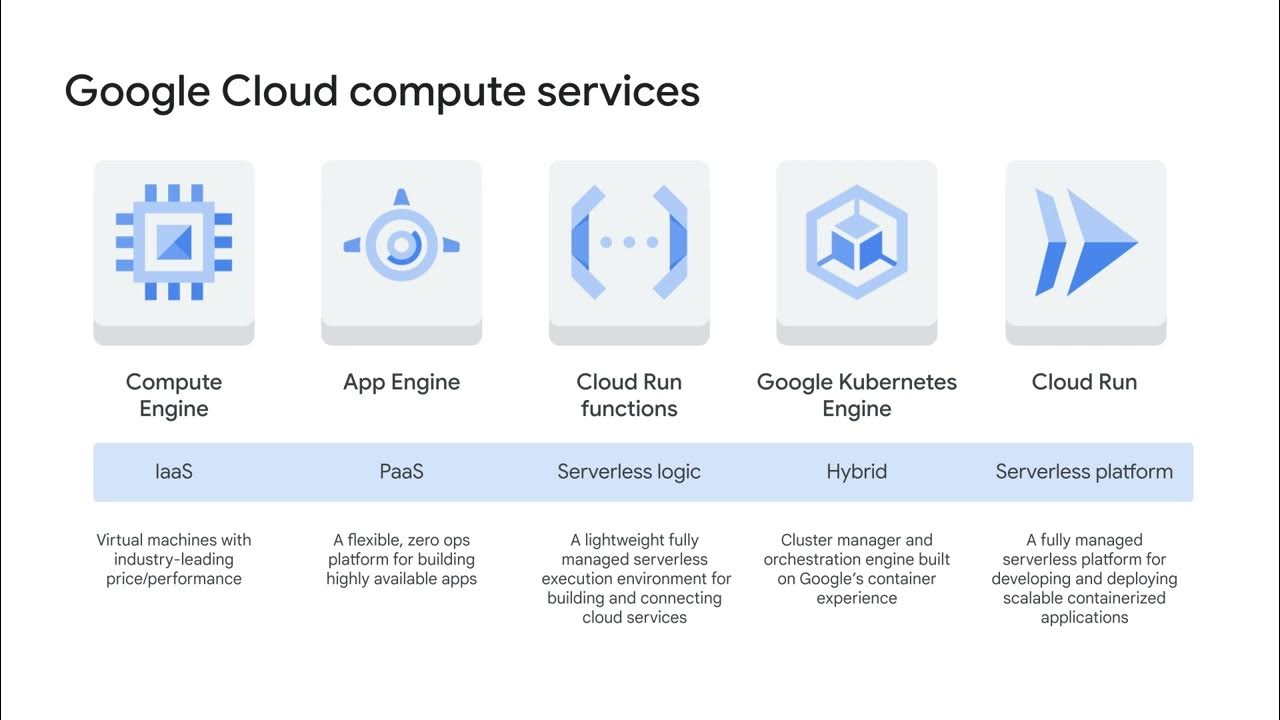Top 50+ GOOGLE CLOUD Services Explained in 7 Minutes
Summary
TLDRThe video introduces the Google Cloud Platform, detailing its evolution from a service available to a select few in 2008 to a comprehensive suite offering 272 services today. It covers core services like Compute Engine, App Engine, Cloud Functions, GKE, and Cloud Storage, as well as advanced tools for data management, machine learning, IoT, and security. The video emphasizes the platform's versatility, catering to both developers and non-coders, and highlights how Google Cloud services can optimize various aspects of modern computing and application deployment.
Takeaways
- 📅 Google Cloud Platform was introduced in 2008, initially available only to a limited number of clients and developers.
- 💻 Google Cloud Compute Engine allows you to deploy compute virtual machines for launching large compute clusters.
- 🚀 App Engine enables developers to create applications with a choice of libraries and frameworks.
- ⚙️ Cloud Functions provides a lightweight compute solution for creating single-purpose functions responding to cloud events.
- 📦 Google Kubernetes Engine (GKE) automates operational tasks of container management and application deployment.
- 💾 Cloud Storage offers worldwide storage and retrieval of data for various scenarios, including website content and disaster recovery.
- 🔒 Google Cloud SQL provides relational databases for data management and analysis.
- 🔄 Cloud Spanner is a scalable, globally distributed, and dynamically replicated database.
- 📊 BigQuery facilitates data management features for big data warehouses.
- 🤖 Vertex AI provides an integrated platform for machine learning, including tools for training and deploying models.
Q & A
What is Google Cloud Compute Engine, and how can it be utilized?
-Google Cloud Compute Engine is a service that allows users to deploy compute virtual machines on Google's infrastructure. It is particularly useful for launching large compute clusters, enabling scalable and flexible cloud computing environments.
What is the purpose of the Google Cloud App Engine service?
-The Google Cloud App Engine service is designed for web hosting and application development. It allows developers to choose from various libraries and frameworks to build and deploy their applications easily on Google's infrastructure.
How does Google Cloud Functions support developers?
-Google Cloud Functions is a lightweight compute solution that enables developers to create single-purpose, standalone functions that respond to cloud events. It eliminates the need for managing servers or runtime environments, allowing developers to focus solely on their code.
What are the benefits of using Google Kubernetes Engine (GKE)?
-Google Kubernetes Engine (GKE) automates the management of containerized applications. It simplifies deployment, scaling, and operations of applications, providing built-in commands and a managed environment for efficient container orchestration.
How does Google Cloud Storage support various data storage needs?
-Google Cloud Storage offers worldwide storage and retrieval of data, suitable for diverse scenarios such as serving website content, storing data for archival and disaster recovery, or distributing large data objects to users via direct download.
What distinguishes Google Cloud SQL from other database services?
-Google Cloud SQL provides fully managed relational databases, making it easier for users to handle data management and analysis tasks. It supports MySQL, PostgreSQL, and SQL Server, offering a familiar environment with Google's infrastructure benefits.
What is the role of Google Cloud Spanner in database management?
-Google Cloud Spanner is a scalable, multi-version, globally distributed database service. It offers strong consistency, horizontal scaling, and automatic replication, making it suitable for mission-critical applications that require high availability.
How does Google Pub/Sub enhance real-time messaging capabilities?
-Google Pub/Sub is a fully managed, real-time messaging service that enables applications to send and receive messages across different systems. It supports reliable message delivery and scalable processing, ideal for event-driven architectures.
What are the advantages of using Google Cloud's Vertex AI for machine learning?
-Google Cloud's Vertex AI provides a unified platform for all machine learning services, allowing users to easily train, compare, and deploy models. It streamlines the machine learning workflow, making it accessible for both novice and experienced users.
How does Google Cloud Armor contribute to network security?
-Google Cloud Armor provides DDoS protection and WAF capabilities, preventing unwanted traffic from consuming resources or accessing virtual private cloud networks. It enhances the security of applications and services deployed on Google Cloud.
Outlines

This section is available to paid users only. Please upgrade to access this part.
Upgrade NowMindmap

This section is available to paid users only. Please upgrade to access this part.
Upgrade NowKeywords

This section is available to paid users only. Please upgrade to access this part.
Upgrade NowHighlights

This section is available to paid users only. Please upgrade to access this part.
Upgrade NowTranscripts

This section is available to paid users only. Please upgrade to access this part.
Upgrade Now5.0 / 5 (0 votes)





